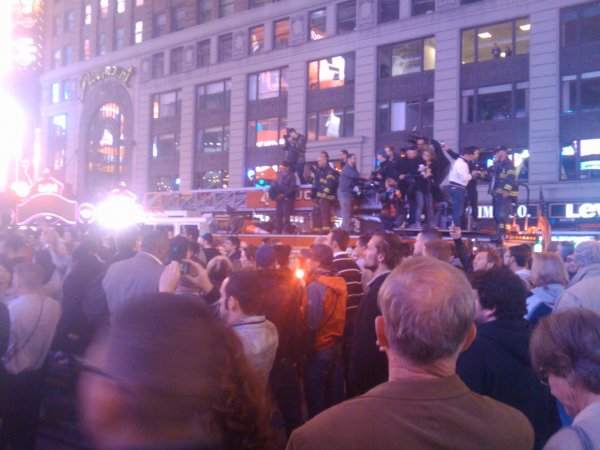The energy in New York was explosive last night as news of Osama Bin Laden’s death spread like wildfire throughout the city.
Around 11 pm, reports of the 9/11 mastermind surfaced on none other than Twitter, before President Obama had even made the announcement.
At around 9:45 p.m. EST, White House communications director Dan Pfeiffer took to Twitter stating, “POTUS to address the nation tonight at 10:30 p.m. Eastern Time.” As speculation seized the Internet, the first credible source announcing Osama’s death was Keith Urbahn, Chief of Staff for former Defense Secretary Donald Rumsfeld. “I’m told by a reputable person they have killed Osama Bin Laden,” he tweeted.

After the announcement came via Twitter, the story raged through the social network, collecting hundreds of retweets and spiking the site’s traffic to around 4,000 tweets per second related to the death.
After receiving the news via Twitter, New Yorkers took to the streets to celebrate Bin Laden’s death by waving American flags and singing the National Anthem and “God Bless America.”
Even at 11 p.m. on a Sunday evening, New Yorkers hopped cabs to Ground Zero, the site of the 9/11 terrorist attacks to revel in the victory. Firefighters in Time Square created a street celebration by riding their fire truck through the streets, attracting cheers from bystanders shouting “USA! USA!”
President Obama did not make the public announcement until 11:35 p.m. EST, a full hour after the story had broken on Twitter and posted to major news sites like the New York Post and the Huffington Post.
The official Osama Bin Laden is dead Twitter account popped up shortly after (aptly named @Osamainhell), as well as multiple Facebook pages.
As Twitter continues to redefine the way we break and consume news, it puts users of the social network at a particular advantage when it comes to accessing information. Like a front seat at the White House briefing, users of the site can get the inside scoop from major journalists and influencers in a raw and immediate format, something previously impossible.
As seen in last night’s street celebrations, Twitter prompts action and response. Like the revolution in Iran, Tunisia, and Egypt, political and physical action has been a direct result of the extreme connectivity social networking sites give us.






